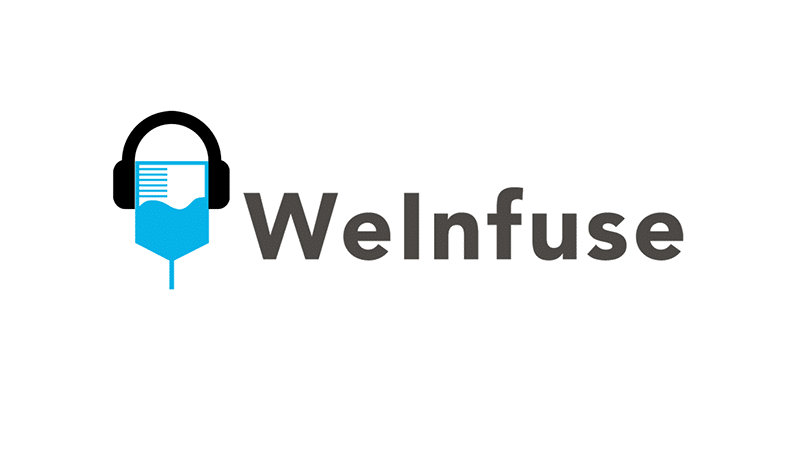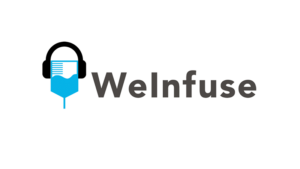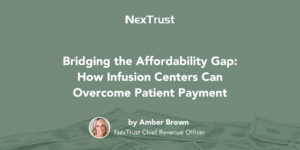Sarah Feasel-Aklilu, DCN, MEd, RD, CNSC, FAND is the National Sales Director – Rheumatology, Gastroenterology, and Multi-Specialty Infusion for Cardinal Health. She offers fantastic insight on a multidisciplinary approach and communication, as well as creating processes and systems to deliver excellent patient care.
Follow on Amazon Music II Subscribe on Podbean II Subscribe on iTunes
Transcript: How to Create a Multidisciplinary Approach to Infusion with Great Processes and Communication
Amanda Brummitt: We Infuse podcast, episode number 47. Welcome to the We Infuse podcast. My name is Amanda Brummett. In every episode, we give you a seat at the table as we talk to Infusion Center owners, operators, and experts so that you can get the insight you need to run a thriving practice. In this episode, we talk with Dr. Sarah Feil, OU of Cardinal Health. She’s their national Sales Director for Gastroenterology, rheumatology and Infusion. She offers fantastic insight on a multidisciplinary approach, communication, as well as creating processes and systems to deliver excellent patient care. Hi, so as I said, we’re here with Sarah with Cardinal Health. Sarah, thank you. So I’ve already shared with our listeners that you’re the national director for gastroenterology, rheumatology, and infusion, but I haven’t given them your background academically, even holding a doctorate and that you practice for many years in a hospital and multiple settings as a dietitian. Can you give us some more insight there?
Sarah Feasel-Aklilu: Sure. Thanks for asking. well, I’ve been a registered dietitian since 2005 and I started my clinical practice. as really like a floor staff dietician and worked with patients in both long term care and acute care facilities, working as a clinical and critical care dietician administering both enteral and parenteral nutrition. While I was a bedside dietician in long term care, I really became known in my facility as a specialist in the area of wound care. I worked really closely with a multidisciplinary on wound management protocols and policies, and was also really interested in quality improvement initiatives. So really honing in on process gaps and identifying where we can do better. I worked closely with so many different teams in my role as a dietitian. I was also often consulting with our pharmacists on TPN regimens, reviewing orders, looking at potential drug nutrient interactions in labs, along with my nurse and physician colleagues. Following, being a floor and staff dietitian, I moved into nutrition and food service management and I had that role in the acute rehab space. So in this role, I supported my dietitian team on the floors as well as the staff preparing and serving patient meals. I also led nutrition policy change within the hospital and also the broader health system at the time. and specialized in spinal cord injury nutrition. So I was the spinal cord injury dietitian in the hospital and really heavily focused on mood management. prevention of wounds and treatment. I really, loved this work and I really gained a lot of opportunities to be involved in spinal cord injury work on a national level. I presented at national to national audiences on nutrition in the STI population. I wrote in spinal cord injury publications and then also supported research protocols that supported nutrition within the spinal cord injury population. And this role in clinical nutrition really gave me a lens into so many aspects of health care, and I really loved learning all the different facets of science and nutrition. So in my years as a clinical health care provider, I really enjoyed when we had representatives from the enteral and parenteral. infusion companies and drug companies coming in to visit and sharing more information about the science behind their products and sharing research and really showcasing outcomes data. At the time I was getting a doctorate in clinical nutrition, and I really wanted to keep learning about science at a different level. And I had always been interested in making the jump to industry. And, since I had the opportunity to do some shadowing in industry during my dietetic internship, I decided to make that leap to the business side of infusion after seven years in the hospital setting. So I moved into sales and the bulk of my sales career was really comprised around selling enteral nutrition products to GI’s, dieticians, within acute care hospitals, children’s hospitals, and home infusion companies. I started selling on a specialty sales team. We were really focused in ICU and GI nutrition and then quickly moved to covering home care and oncology. There were so many changes happening in health care reform in like the 2009 to 2012 period. And our team was really focused around quality, of care and showcasing how our products could provide that quality care to individuals. So from that, sales role, I moved into a clinical liaison role where I was focusing on really helping hospitals identify where they had gaps in nutritional care and help to fill those gaps with. enhanced screening tools. Being that I had the role as a clinical nutrition manager, I really had that firsthand experience and knowledge with quality improvement and was able to quickly identify practice gaps. And this was a really great opportunity to apply my previous learnings and my previous experience. When I was a district sales manager, I was completing a residency program, for school with my, doctorate in clinical nutrition. And this was a 500 hour residency program. And I was able to focus in on specific areas of healthcare. So I focused on trauma and surgical critical care, as well as adult gastroenterology. I worked really closely in this role with our infusion pharmacists on the units. we had many patients on TPN. and really had to monitor them daily. There were daily adjustments and we had to ensure that we always had a dedicated line for those patients due to the variety of IV medications we were giving to them and, that was challenging with, the traumas that we had on the unit, but really work with those infusion pharmacists to learn a lot and apply a lot of my nutrition education. So with that, I joined Cardinal in January, 20, 2022 as the national sales director of RA, GI and multi specialty infusion, working with infusion centers throughout the country. Well,
Amanda Brummitt: you have
Sarah Feasel-Aklilu: an
Amanda Brummitt: incredible journey and I love your hands on. multidisciplinary approach to patient care. It sounds amazing. I bet, I bet people loved working with you at the bedside and now love that knowledge in your current role. I am curious, with all of that background, how does that change your approach to infusion?
Sarah Feasel-Aklilu: well, I think that I’m able to, offer a unique perspective because I have played many roles. Like you said, I’ve, been the healthcare provider, I’ve been a clinical liaison, I’ve been a sales consultant and having been on the provider side, like QI, like I said, is where I look at, first. Where can improvements occur? I think I’m a natural problem solver. So that was always where people put me like, Sarah, figure out what the problem is and how can we fix it? and I, did that throughout my career at the, in, in clinical nutrition. So I can really quickly. learn and understand business challenges, quickly identify, results oriented solutions because I’ve constantly been on teams that were adjusting and changing basic based on trends in healthcare, both in clinical and well in sales. and then also I’ve assisted leaders throughout healthcare, identify solutions. and oftentimes they’re low cost solutions to challenging problems that they may not have, seen, or had that education on. previous to working with me. And I’ve been involved in implementation of process and healthcare facilities and really understand the impact that changes to process or workflow can have on a practice or facility. So really that involvement in QI, working with nurses and physicians, in my different roles and having that experience in research, I think I’m really at a point where I’m able to understand, their needs and how to help them thrive.
Amanda Brummitt: Yeah. So you mentioned challenges. What are some of the biggest ones you’ve experienced on the infusion side?
Sarah Feasel-Aklilu: well, I would say that there’s, there’s always challenges, but I mentioned in the beginning communication and I constantly come back to communication as being something that’s just so important to make sure that we’re staying. on top of, in, in any part of healthcare. So as part of my residency, I was working with a home infusion patient. She was receiving TPN, that was prescribed due to Crohn’s disease. She was relatively young, like in her mid sixties. And this case really intrigued me because I was trying to understand why, she was, on parenteral nutrition, why she was getting this, as a home infusion, because it’s not routinely the standard of care, unless, there’s a bowel obstruction or she had a high output fistula or something like that. So I really wanted to understand what was happening with this patient and, She was communicated with, over the phone, on a monthly basis. And, the home infusion sent products to her home. And, she was just going on her merry way, but I really wanted to dive in deeper and understand the whys behind why she was on this regimen. So, what I understand stood from speaking to the home infusion team and the GI team was really that this patient was on, parenteral nutrition because she didn’t want to try enteral nutrition and she had a history of having a fistula after some, non compliance with adalibumab and while that was, there, we didn’t have any details or any records on the fistula. We just, we didn’t have. more information. So I was like, okay, I’ve got to dig deeper. Like, what, like still, why is she on parenteral nutrition? Like I still didn’t have an answer. and this was really challenging because I wanted it clear. I wanted clarity. I wanted it to be black and white, as to why she was on this long term, expensive TPN regimen. So, me and my preceptor, we dug, into the notes, we were, trying to figure, out the whys and there were really no records that we could find on her surgical history. We didn’t know how much bowels she had. And all of these to me were like clear gaps in communication that happened in the care of this patient. So, while home parenteral nutrition is a great option for people who meet the criteria, we just could not continue to find a reason why this patient was on it. But we also, weren’t sure how to take her off either. she was at greater risk for central line associated bloodstream infections, compared to being on an enteral regimen. And we really did not have good communication or documentation as to why she was on this regimen. she did not have the right, vascular access device. Like, after digging into this, we saw that there were a lot of communication breakdowns. But until we could get that communication in place to make sure that she was receiving the best care possible. unfortunately for this patient, she actually ended up in the hospital two times for central line associated bloodstream infections. And the hospital team that saw her was like, Well, why is she on parenteral nutrition? They took her off of it in the hospital. They put her on an oral diet and the parenteral nutrition was discontinued completely. And she was able to eat by mouth with no complications. So overall, like this to me and my preceptor, we saw that there was just between home infusion, between the surgeon, between the GI, between nutrition. There were gaps in communication, and what was really needed for this patient and what she received. And it was apparent that we, could have done such a better job for her. if there was stronger communication on a regular basis between that home infusion staff and the providers as to, what’s happening with the patient and why. So I continue to come back to like, always dig deeper, always ask that extra question. And don’t be afraid to, to make some waves and, make some changes because at the end of the day, it might end up, working out better for, the whole team at the, end of the day. And definitely for the patient. That
Amanda Brummitt: is incredible. yeah, that breaks my heart for both the patient and the care team. It sounds like, it was distressing for all of you. any key takeaways that it sounds like communication has been a theme for you throughout your career. Any key takeaways there that you can share with our listeners that have really helped you up your game in that area?
Sarah Feasel-Aklilu: Yeah. So I would say, really know your core team and ensure that you have strong communication, from all sides. with, the people that you do business with, distribution, et cetera, but also be comfortable with, asking those questions, with stepping up to the plate and showing providers that you know what you’re talking about, because that proactive communication across the care team can really help ensure that no patient falls through the cracks. so here are some, the ways that we are helping infusion centers so they can focus on patient care. we have a dedicated team, my team to support your practice and infusion centers, with our specialty GPOs. So you don’t have to shop around for the best pricing. We will work through that for you. And as a GPO member, we You will benefit from expanded options and access to products and manufacturers, thanks to the relationships that we have at Cardinal Health, as well as exclusive, reliable distribution through Metro Medical. We also offer a suite of technology solutions, really, unlike any other. And like I said earlier in the days of paper charting and documenting stuff on paper, that made stuff harder. And now with the technology that we, have in healthcare, It’s amazing. And what Cardinal Health is able to offer is, we have the only real time GPO contract dashboard that really helps maximize revenue in your practice by showing where you stand in achieving the next rebate tier. We have a team that is, loading this information daily and this, integrated and updated view of your contract portfolio allows you to make more informed decisions, easily monitor contract performance, and get the highest dollar from and get the highest benefit from every dollar spent. Along with that, we offer advanced practice analytics to help you monitor that revenue cycle by seeing daily updated drug utilization, claims payment, and denials and reimbursement. So this really helps you stay on top of your reimbursement trends and take immediate action when changes occur. I know a lot of that is, is stuff that can be really challenging and take a lot of time. And if we can make that easier for you, that allows you to focus more time on patient care, which at the end of the day is central to everything that you do. And in addition to our suite of practice solutions, we offer consultative support to help practices reach their goals and prepare for the future. We understand that biosimilars will play an increasingly important role in infusion in the future. they already are. And we are arming our customers with knowledge to be prepared for team for the changes to come. we are providing knowledge around payer coverage decisions. So we offer all of this with a single point of contact on my team. while, there’s a team behind them. We really want to streamline the process by giving customers one point of contact for all their questions.
Amanda Brummitt: I’m glad you brought up biosimilars, because I’m super curious with your diverse infusion experience if you could share a little bit about how infusion centers and practices can prepare for them.
Sarah Feasel-Aklilu: Yeah, well, I would say like learn as much as you can about the biosimilar, about biosimilars in the landscape. There are a lot of resources out there and Cardinal Health has some. The FDA has the new biosimilars curriculum. and I would say, learning about this space has come really quickly for me over the past two and a half months, but through speaking with our customers and then our internal experts, I’ve learned a tremendous amount about the landscape of biosimilars. Here at Cardinal Health, we recently released our 2022 biosimilar report, which includes a pipeline of biosimilars that are anticipated to come to the market over the next several years. And we expect this market for infusion biosimilars To continue to grow, and enter a completely new therapeutic areas with anticipated biosimilars, including for Lucentis, Ilea, Xolair, Xgeva, Simponi Aria, Tysabri, and Saliris. this new slate represents over 10 billion in reference product sales that we expect to face biosimilar competition over the next four years. this new slate really is, is going to change that landscape. So for more information, check out the full report on cardinalhealth. com, backslash biosimilars. the report, every time I read it, I learned something new. I have it right here next to me. And honestly, it is, it is just such a wealth of information, printed out, keep it on your desk and keep it as a, as. a reference tool. The other thing that I would say is as I’m talking to customers, they’re really looking at, okay, what kind of strategy do we need to think about? And, I would say some people are ahead of the game. Some people are maybe in the middle and some people are a little behind with developing a biosimilar adoption strategy and educating the care team on those products. And getting a champion, a biosimilars champion within your organization, so they can keep the team updated on what’s happening and what the trends are. And then next, really the overall financial and operational considerations of your biosimilar strategy. and that really needs to go just be beyond product costs, but to also look at product by product. Profitability, looking at your inventory management and workflow efficiencies to navigate that environment, where you have several product options instead of just one. and then the other thing is that we do have, we can help, on our side. We help practices and infusion centers navigate all of these complexities for implementing a biosimilar strategy, including payer and reimbursement dynamics while you’re making sure that you’re ensuring that. Care is, given, from a patient centered perspective. And I know that, we’ve had practices reach out to us recently that are really looking to develop these strategies to understand state by state coverage, that variability. And you can work with us, on, looking at those strategies and get a little bit of insight to that with our team here.
Amanda Brummitt: Great information. I’m going to have to go look up the 2022 biosimilar report. It sounds amazing. Absolutely. So shifting gears just a little bit. I understand that we infuse and Cardinal Health just announced an exciting collaboration. Are you able to share a little bit about it with us?
Sarah Feasel-Aklilu: Yes. so we are so excited to collaborate with WeInfuse on the WeInfuse Distributor Connect program. This really enhances the customer experience with the WeInfuse software. So this is really, through the Distributor Connect program, we infuse clients receive an, an additional choice to meet their center’s needs to order their medications from participating distributors like us, like Cardinal Health, directly within the WeInfusion software. So in addition to ordering directly on, or ordering directly online, those practices, We’ll be able to just fill that, fill that order, for, without leaving the, we infuse platform, which is awesome because then, you’re saving time, that you can be dedicating to patient care. This collaboration shows just one way that Cardinal Health is dedicated to supporting our customers. So they can focus on patient care and prioritize keeping communication strong among the care team.
Amanda Brummitt: Fantastic. Always like anything that makes it easier for people.
Sarah Feasel-Aklilu: Yes. And, thank you to we infused for really making this easy and seamless for our customers.
Amanda Brummitt: Sarah, you have shared so much good information. What is one last piece of advice that you can give to our listeners?
Sarah Feasel-Aklilu: Well, like I said, I think that, at the crux of, everything in healthcare, communication across the care team is so critical so that no patient, falls through the cracks. No patient or process falls through the cracks. this seems easy, but we have a lot of fragmentation in, healthcare. And so it’s important to keep asking questions until you have an answer. you may be that person who makes a difference for that patient, from a health standpoint, from a quality of life standpoint, by just, if you feel something needs to be improved, ask, communicate. and my team has solutions and products. to help practices and infusion centers do what they do best care for patients. We can really help you overcome business challenges and reach your patient goals. So you can focus on what matters the most that’s delivering exceptional patient care. We have technology solutions to ensure that things don’t fall through the cracks in your business. And that’s why we’re really excited about the collaboration with WeInfuse. And working with us, you have a team that is, that is also strong, that are strong communicators as well. And we will work on behalf of customers to keep asking those questions, to our partners to make sure that we get the answers for you.
Amanda Brummitt: Fantastic. Sarah, thank you so much for your time and for all that you’ve given back to healthcare. We really appreciate you. Thanks.
Sarah Feasel-Aklilu: Thanks for having me.
Amanda Brummitt: What great information from Sarah on communication processes and preparing for biosimilars. And I’m so glad that she was able to let you know about the new WeInfuse and Cardinal Health collaboration. Well, if you haven’t done so already, do yourself a favor and give the WeInfuse software platform a test drive to see how it can save you time and money in your practice. My name is Amanda Brummett and we’ll catch you in the next episode.
Guest Speaker:
Sarah Feasel-Aklilu is the National Sales Director for Rheumatology, Gastroenterology, and Multi-Specialty Infusion at Cardinal Health. Sarah has over 7 years of clinical experience as a registered dietician, and she received her BS in Dietetics from Ohio State University, MEd in Nutrition Education from Columbia University, and her Doctorate in Nutrition from Rutgers University.




